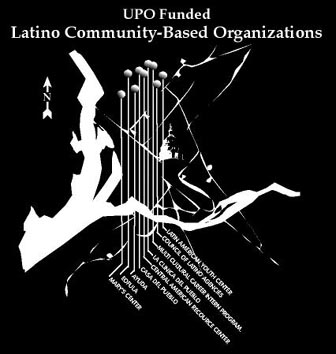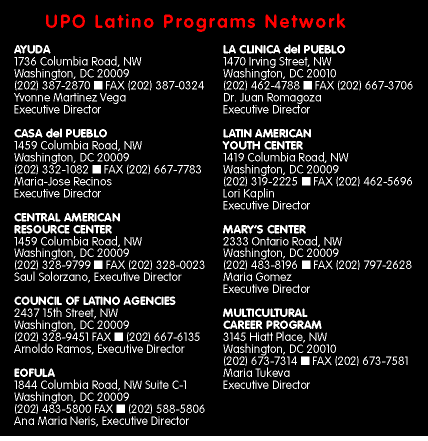For your free copy of the "UPO REPORTER" newsletter,
send an email to Darlene Booker, or send your request via postal mail to
UPO REPORTER
401 M Street, SW - Washington, DC 20024-2610
AUGUST 2000
VOLUME 13, NUMBER 3
UPO Funding of Latino Community Organizations
Helps Diverse Neighborhoods Prosper
If the community action concept stands for anything, first and foremost must be its provision of specialized services to a community, most often a community in need. The United Planning Organization lives up to its long standing goals especially with respect to DC’s strong, long established, and burgeoning Latino community.
According to the Council of Latino Agencies, the City’s Latino population may number as many as 80,000 (1990 figures), giving the traditional under counting that often occurs during the Census.
While community members hail from many countries, most in DC come from El Salvador, Mexico, and Puerto Rico. Many live in the Adams-Morgan, Columbia Heights, and Mt. Pleasant neighborhoods where the sounds of salsa, calypso, and mambo are heard as well as rap, soul, country, and classical. The Latino community is diverse, with diverse interests, representing many nations as well as those individuals born in the United States. DC’s Latino community brings a unique quality of life to the city making the Nation’s Capital the envy of other jurisdictions nationwide.
Notwithstanding the diversity, certain services are needed, and UPO delegate agencies along with the special programs, quickly “step-up to the plate” with high qualit
y programs much prized by the community.
Children sport their very own soccer uniforms as they prepare for the day's
practice. Just one of many daily activities held at Casa del Pueblo.
Aside from long established UPO delegate agencies such as CHANGE, Incorporated and the Center City Community Corporation (4-Cs) that have for years provided services to the Latino community, other special interest groups are now part of the UPO family.
Perhaps the oldest of the new is the Council of Latino Agencies, a UPO funded program founded in 1977 by community activists and concerned community residents who after carefully surveying their community, saw a need for an organization to help mobilize grass roots groups and better position themselves in a cost effective, comprehensive and professional manner. Affectionately known as the “Council,” this group joined the UPO family in 1983 at that time calling itself the Council of Hispanic Community and Agencies. The Council, headed by Arnoldo Ramos, has grown immeasurably since those early years, itself now serving as an umbrella agency to more than 37 DC multicultural community-based organizations. The Council now shares space with other nonprofit organizations and a charter school in a recently renovated historic building now known as the Josephine Butler Center, named for the late community activist and located in Washington’s famed Adams-Morgan community.
Meanwhile, not far from the Council of Latino Agencies, and neatly tucked away along the lower recesses of the rustic but stately Calvary Methodist Chu
rch on DC’s sprawling Columbia Road, are two unique community organizations that serve an important segment of the DC community, Casa del Pueblo and the Central AmericanResource Center.
Maria-Josè Recinos heads Casa del Pueblo.
Casa del Pueblo, a group formed in 1985 by concerned citizens, is a community-based organization thatserves community youth primarily in the Columbia Heights/Mount Pleasant neighborhoods of Ward 1. Casa del Pueblo provides educational, social, cultural, self-improvement and empowerment needs of the community’s Latino community, especially helping smooth the path for those who have recently arrived. Headed by Ms. María-José Recinos, the organization enjoys vast support from local residents. Buoyed by its enthusiasm, Casa del Pueblo continues to evolve while keeping close in its memory the neighborhood disturbances of 1991 that brought national attention to what some then believed was a neglected part of the city.
Also sharing space in the historic Calvary Methodist Church is the Central American Resource Center, a group established in 1981 specifically to respond to the unique needs of the Central American community. Headed by Saúl Solorzano, CARECEN provides legal representation especially with respect to immigration matters. The group offers a popular One Stop Services program that includes translation services (often on a walk-in basis), assistance with form preparation, employment assistance, and three-way conference calls among others. Educational empowerment programs are a key element that CARECEN uses to improve the welfare of the Central American community.
Saùl Solorzano directs CARECEN.


Health issues are always important and the UPO funded agencies provide the quality services that keep citizens healthy and health wise. La Clinica del Pueblo
, under the direction of Dr. Juan Romagoza, provides quality health care for many Latino residents. Comprehensive health services to more than 8000 patients per year include preventative medical services, health education, and patient advocacy. Now located in a cramped facility that requires patients to climb as many as 52-steps in order to reach the clinic, the group is working hard to move into a spacious new state of the art medical facility.
Dr. Jual Romagoza heads La Clinica del Pueblo
Another health related organization is Mary’s Center for Maternal and Child Care. This program, founded in 1988, is located in a bright newly renovated facility near Washington’s famed “U” Street. Directed by Maria Gomez, who with other health care workers helped to establish the facility, the center provides prenatal and pediatric health care to an ever growing population of community residents. Among the numerous social services are home visits to new mothers and their babies shortly following delivery, help with family planning, as well as primary care from birth to age 13.
UPO continues a long tradition of outstanding services to senior citizens and EOFULA Spanish Senior Center is no exception. Headed by Ana Maria Neris, EOFULA (which actually stands for Education Organization For United Latin Americans) was established in 1969 and has continued its quality operation over its 31 year life. Services include the provision of nutritious lunch, senior transportation, educational activities, case management/counseling, crisis intervention, and English classes. Seniors also receive various types of hea
lth screenings, housing assistance, employment assistance, and translation services, and others. The group has set its sights on a spacious new location and is working to realize its dream.
Several dedicated EOFULA staff pose for photo at center.
Founded in 1971, AYUDA is a community-based organization that provides legal, advocacy, empowerment, and educational services primarily for low-income Latino and other foreign born families in DC. Widely recognized as one of the City’s most comprehensive legal service organizations, AYUDA, headed by Yvonne Martinez Vega, is at the forefront of the advocacy movement. AYUDA (which is the Spanish word for “help”) also provides emergency one-stop legal and social services to immigrant and refugee women who are fleeing domestic violence. When the discussion turns to Latino legal representation, the highly charged AYUDA team is always among the first to be recognized.
Teen health and pregnancy p
revention is of paramount importance and the UPO funded Bell Multicultural Career Intern Program lives up to those goals. This program provides sexuality education and promotes abstinence for the entire student population at Bell Multicultural High School. Becoming fully interwoven into the DC Public School System in 1989, the Bell MCIP focuses on social services, career and technical training courses and others designed to address the specific needs of its students. Some students are in need of developmental English, and the Multicultural Program addressees that particular need. Bell MCIP is headed by Maria Tukeva.
Lawyers and law students conduct research and work on cases at AYUDA.
Young people are from time to time considered a vulnerable segment of our community. In an attempt to help with their development and keep youth on the correct path, the Latin American Youth Center was established in 1969 by area citizens concerned with the plight of their neighborhoods. LAYC’s programs and services, go along way to better the lives of community residents. Programs such as Youthbuild, Youth Radio DC, Upward Bound, and
After School Tutoring among others, keeps in focus the role it has taken over the years. Statistics, which may look grim to some, are seen as a challenge to the LAYC, and if community support is any indicator, they have achieved their goals.
Always ready to stand up for the community is Arnoldo Ramos, head of the Council of Latino Agencies.
Having recently moved from cramped two-story town house into a multimillion dollar facility, the LAYC has reached a plateau many others only dream. The ultramodern 5-story building that is now their “casa,” was once a decrepid vacant building filled with those elements that are destructive to neighborhoods. But the LAYC family had their dream - a dream that was ultimately realized when in early 1999, the group moved into the sparkling new building which now houses the Next Step charter school, a fitness training center, cafeteria, small radio studio, comprehensive computer lab, game rooms, and such other components that daily draw hundreds of youth into the building. Headed by Lori Kaplin, the LAYC provides comprehensive youth and family development such as employment and training programs, health education, after school/weekend activities and family support among others.
The City’s Latino population grows everyday mainly with caring individuals and families who participate in those activities that make the District of Columbia a vibrant place to both live and work. With this ever increasing population, these UPO funded activities become more important everyday, helping to make DC life a bit happier, healthier , and friendlier, for all its citizens.
.
###
Other articles - this issue
1. UPO's Funding of Latino Community Organizations Helps Diverse Neighborhoods Prosper.
If the community action concept stands for anything, first and foremost must be its ...
2. Youth Issues Top Agency's Thrust During Summer
DC's young people have long recognized UPO as a place to go for quality ...
3. DC Students Awarded Record Number of Scholarships
UPO's 37-year commitment to education was onece again evident ...
4. UPO Acquires Operation of Senior Network
It has had several names during its 30-year existence, actually starting out as ...
UPO REPORTER
Published by the Public Information Office
United Planning Organization
401 M Street, SW Washington, DC 20024
President: Russell D. Simmons
Executive Director: Benjamin Jennings
Writer/Editor: Harvey N. Johnson III
Click here for main "REPORTER" page
UPO Main - What is UPO? - Corporate - Communications - UPO Programs - UPO Network - Special Activities
UNITED PLANNING ORGANIZATION
401 M Street, SW - Suite 200
Washington, DC 20024-2610